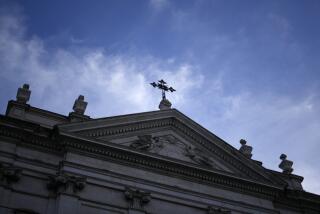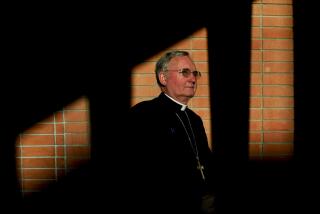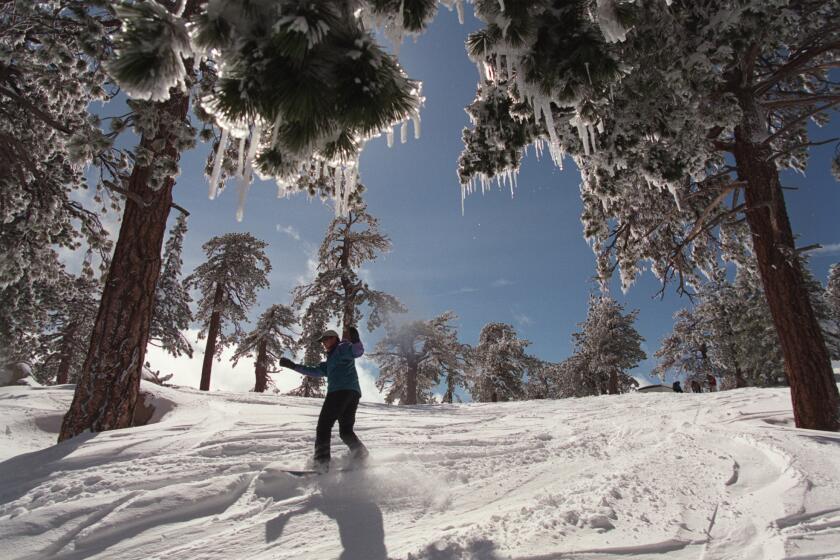Douglas Kmiec on keeping the faith
Talk about tests of faith. Douglas Kmiec is an influential Roman Catholic scholar, a veteran of Ronald Reagan’s Justice Department and a Pepperdine University constitutional law professor. What he’s gone through in the last handful of years, he sums up pretty well with the title of his latest book, “Lift Up Your Hearts: A true story of loving your enemies, tragically killing your friends, and the life that remains.’’ His interfaith work earned him President Obama’s appointment as ambassador to Malta. During his tour, he engineered the seagoing escape from Libya of Americans in February 2011 as civil war erupted, but he was criticized over his interfaith advocacy — and eventually resigned. Last month’s killings in Benghazi have made Kmiec think more deeply about religion, politics and his own mission.
You’re supporting President Obama again?
There are a few places where we had disagreements, [but] when you see someone who’s devoted completely to people who have less than himself, who worries about our tax system and society and economic opportunities, how can you not be for those ideas and the person standing behind those ideas? So it’s a no-brainer for me.
You were criticized, to say the least, for endorsing him in 2008.
People still tell me I will go to hell because I endorsed him. I listen and say they may be right, in which case I’ll have a lot of special pleading to do at the Last Judgment. But the God I know is just and merciful, and people trying to do good in his name won’t be turned away.
You knew Ambassador J. Christopher Stevens, and so your response to his killing has been personal.
I’ve written President Obama and the secretary [of State, Hillary Rodham Clinton]: I would be willing to try to carry on Chris’ work in Libya. Malta was Libya’s closet neighbor. I can take some risks, and I know Chris took them with full knowledge. [Risks] are a statement of confidence that what we value will be respected by the Libyan people, and the Libyans will respect our presence.
The last thing Chris would want is for us to underestimate the importance of Libya and their commitment to a stable government based on the rule of law.
My first encounter with Libya was getting embassy [people] out of Tripoli when Kadafi decided he was not going to step aside. Things got very dangerous very quickly. I rented a catamaran and, with the concurrence of the secretary, we were able to get Chris and his staff out. It had to sail through tough seas. For a while it was pretty dicey; we brought everyone home safely.
What was your ambassadorial portfolio from the president?
There are 365 Catholic churches in Malta, and I said, “One for every day of the year,” and he gave me that Obama smile and said, “Make sure you go.” That was a very astute instruction. It got [me] out of the embassy and into neighborhoods.
Because Malta is a busy port and on the threshold of the Middle East, one primary responsibility was to ensure the effectiveness of Iranian sanctions.
He hoped an interfaith dialogue would give rise to a blossoming of diplomacy. He was inserting me in a pivot point: to the south, Africa and a Muslim world; to the east a Hebraic world; to the north, Christianity and Europe. He basically said, “See what you can do, so you can [anticipate] when sensitivities have been crossed that might give rise to violence or military action.”
Had we been more advanced on that, Chris Stevens might still be alive; there would have been channels of communications where people could have raised their grievances.
It seems your State Department critics didn’t get the memo about interfaith dialogue. They thought you spent too much time on such issues. Should the president have told them to back off?
I fully expected that was going to be the outcome, and to this day I’m not quite sure what made that impossible. My evaluation [by the Office of the Inspector General ] was a fair one; it had lots of compliments and lots of good constructive criticism. By the time it got published, all the compliments had disappeared. [Then a] project to do simulations of conflict resolution [with] faith-based techniques — the plug was pulled almost without explanation.
Did you get thrown under the bus?
I don’t think so, because the president hasn’t changed one iota from this [commitment to ecumenicism].
The line between private faith and the public sphere is a ferocious election issue. You were denied Communion in 2008.
I was invited to [speak at a meeting about] Catholic teaching as it applied to the election. I hadn’t realized maybe it was something of a setup. The homily [at the Mass beforehand] was about the evilness of people endorsing Obama. When I got to the front of the Communion line, the priest said, “Not you.’’ I said, “I think you’re making a mistake, Father,’’ and he said, “No, you’re the one who made the mistake when you endorsed Barack Obama.’’
A fellow at the back of the line yelled out, “Are you judging this man, Father?” Cardinal Mahony, not at my behest, made [the priest] write a letter of apology. Ultimately Catholics did vote for Obama overwhelmingly, [for] the reason I admire: that he does search out common ground.
You are antiabortion; Obama is in favor of abortion rights. But you also see abortion as part of a broader policy position, including issues like the death penalty, poverty and war. You don’t have a single-issue test for a candidate.
There is a tradition we trace back to Joseph Cardinal Bernardin of Chicago, of the seamless garment — all life issues are interrelated: abortion, capital punishment, war, a family wage, the environment. You can’t take these things apart. More and more Catholics understand that, but some very important Catholics are resistant.
People on all sides tend to run to get the law on their side and then to say, “See? We’re right.” That kind of smugness cuts off dialogue. If you have a message about the sanctity of marriage or human life, deliver it to me. Move my heart. Change my mind as I’m sitting in your congregation. Don’t run to Sacramento or Washington and put it in some statute and then say, “I’m right because the law is on my side.”
Everybody wants to solve [same-sex marriage] with law. I don’t need the state to define marriage for me. I need the state to treat citizens equally, to give everyone the benefit of the rule of law and not shape it to favor one side or the other. At the same time, give individual churches the opportunity to define marriage as they read their religious practices.
The president promotes social justice as if he were a Catholic. I get in trouble when I say that. I was fooled by one of my friends in the White House. He called and said, “I want you to be the first to know Barack Obama has converted to Catholicism.” He let me talk for 10 minutes about how I knew it was going to happen, and all the while, laughter is building on the other side, and he said, “Isn’t it April 1 in Malta as it is in the U.S.?
What are your thoughts on the 2012 campaign?
[Mitt] Romney says 47% won’t vote for him because they’re dependent on government — it’s not that we’re dependent on government; we’re dependent on each other, and government is one means [to] fulfill our obligation of love and service.
Ronald Reagan at the ’80 convention said five words framed what [he was] going to do: family, neighborhood, work, peace, freedom. I think he would be closer to a Democrat [now] than this Ayn Rand notion: the poor are parasites, leave me alone.
We don’t want to be left alone. We want to be in dialogue with those who see the world differently, and to live in peace.
Are you still a Republican?
I would view myself more as an independent now, and I suppose the Republicans would breathe a sigh of relief because they wouldn’t want me anyway
In May 2010 you were driving two friends, when you suddenly passed out. Doctors don’t know exactly what happened — it may have been related to medication for your Parkinson’s disease. You survived the crash and your friends didn’t. How do you come to terms with that?
When the unexpected, the tragic enters our lives, we can build on that and grow from it. Appreciate the grief, because that commands an understanding that goes beyond yourself. The loss can never be replaced, but not to get beyond it is to magnify it in ways that those who died would not want. You have a greater obligation to live more fully, more responsibly. You can’t just float along the surface.
[After] an accident, some people say to God, “Why me?” It is not God sitting there dictating. We can’t blame God when bad things happen. There are so many people whose faith is a faith built only on happy times. That’s not faith, that’s an insurance policy, and a very narrow and thin bargain.
How is your health?
I’m reasonably OK. The Parkinson’s manifests itself in a way that after a short period of time on a keyboard I have to go to dictation. [Otherwise] I send lots of amusing emails with either wholly incomprehensible things or insults embedded in them that I don’t know I’m saying. I have to go to dictation.
Follow Patt Morrison on Twitter @pattmlatimes
This interview was edited and excerpted from a taped transcript. An archive of Morrison’s interviews can be found at latimes.com/pattasks.
More to Read
A cure for the common opinion
Get thought-provoking perspectives with our weekly newsletter.
You may occasionally receive promotional content from the Los Angeles Times.







